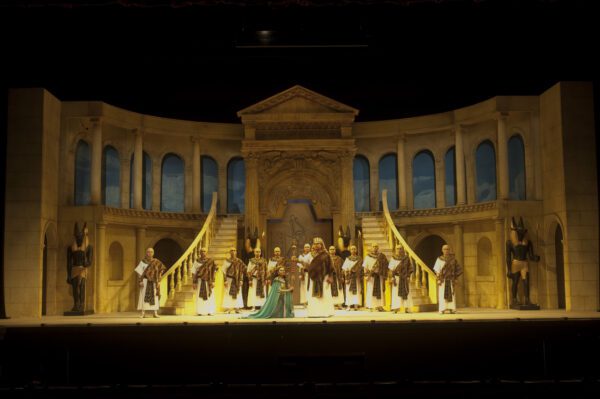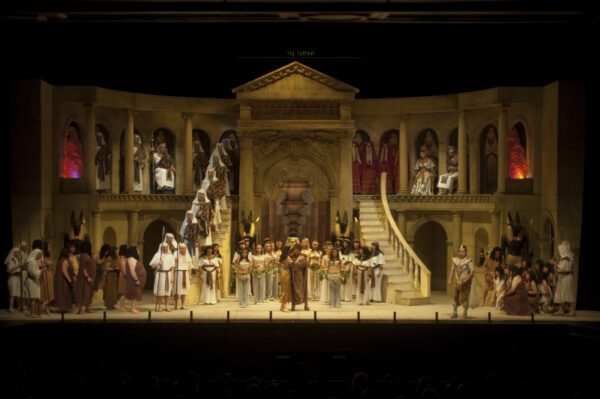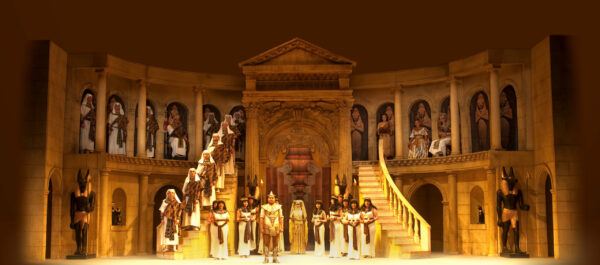Review: Ellen Kent’s Aida
By Hanna Patla

As a complete opera-virgin, I was slightly reluctant to review Ellen Kent’s adaptation of Verdi’s Aida, an opera based on the story of a captured and enslaved Ethiopian princess, Aida, and her doomed love with Egyptian commander Radames.
I walked into Manchester’s Opera House with a feeling of trepidation… Opera is often presented as an exclusively middle-class, wine-sipping, rather stuffy affair which I was convinced I had no place in. Unfortunately, from what I could see, these stereotypes were largely based in fact, and although I did spot the odd under-30, they were few and far between. This immediately led me to the worrying thought that in 20 years, this form of theatre may well have died out.

The performance itself was impressive, with the intense vocal acrobatics the performers were pulling off certainly being a thing to marvel at. Olga Perrier as Aida used her beautifully crisp soprano tones to truly embody this desperate, loving but torn character. Her torment in the painful choice between love and loyalty to her father and country was especially powerful.
Likewise, her foil, Amneris (Natalia Matveeva) had a fantastically performed villain arc, going from a girl scorned in love to a vengeful woman filled with fury. It reminded me strongly of the Marius/Cosette/Éponine love triangle in Les Mis, with Amneris portraying what would happen had Éponine turned murderously wrathful. I greatly enjoyed the choral numbers but then I am a sucker for a good harmony so that was not surprising.

Radames (Vitalii Liskovestskyi) was technically glorious, with his deep and piercing voice definitely striking even the audience members sitting right at the back. However, my stand-out performer of the night was Ethiopian King Amonasro, skillfully portrayed by Olexandr Forkushak. His performance was the most diverse in emotion, going from a cheeky father-figure to Aida to a cunning manipulator, willing to hurt his daughter for victory.

The dancing, however, felt unpolished, with the timings seeming off in ballet pieces and costuming problems being obvious to the audience members. For example, in the dance of the Triumphal Procession, one of the girls was wearing a completely different orange top to the others (who were all matching), without having a featured part. This unfortunately drew negative attention to her and meant that I struggled to enjoy the piece as a whole. My eyes kept wandering to the odd one out!
Nevertheless, the energy that the children from both Stagecoach Theatre Salford and The Cheshire Theatre School brought to the stage was electric so the slight issues were easily forgiven.

Set design was certainly a strength in this adaptation with an intricate and very ambitious setting consisting of an archway decorated with realistic carvings and columns. Lighting effects were also used in a stylised manner to create scenes of fire and add to the feeling of doom that permeated through the piece.

Unfortunately, I feel that we’re in a catch-22 with opera; with younger people being put off by its reputation for snootiness, leading to the only audience members remaining being those who gave it that reputation to begin with. Most young people and students will book the cheapest tickets they can find. This tactic usually guarantees you a half-decent view. Good enough at least for the primary plot of the piece to come across.
With Aida though, I felt that the majority of the long-term watch-ability rests on the subtitles and their effectiveness. Operas are predominantly performed in foreign languages and so my (like many others’) understanding rested on the little screen above the stage which translated the Italian into English, helping me to have a semblance of an idea about what was going on.
Upon walking in, however, I noticed that those who had booked the back of the stalls (the cheap tickets that most students would go for) had no access to the subtitles except for the taunting glare of the blue screen light, alluding to the fact that others could understand what was being sung. Even from my seat, the subtitles were an issue as there were times that the screen remained blank, leaving whole stanzas totally meaningless. This was by far my biggest issue with the show.

Overall, Ellen Kent’s production of Aida was certainly worth watching. The vocals were fantastic, as were the effects and set design. However, issues such as the subtitles being inaccessible for some audience members as well as little mistakes in dance and costuming did detract from the ambience of the piece. It was clear that this performance meant a great deal, and there was not one member of the audience who was not touched when, post-bow, the conductor Vasyl Vasylenko emerged and led the company in a rendition of the Ukrainian National Anthem.
Ellen Kent is touring the UK with three operas (Puccini’s Madama Butterfly, Puccini’s La Boheme, and Verdi’s Aida) until May 8. The three operas were performed over consecutive nights at Manchester Opera House, beginning with Madama Butterfly. Most cities are only getting two operas; we feel very fortunate to have gotten to cover all three of them in Manchester. Be sure to check out our reviews of the other two operas. Ellen Kent will return to Manchester in 2024.







